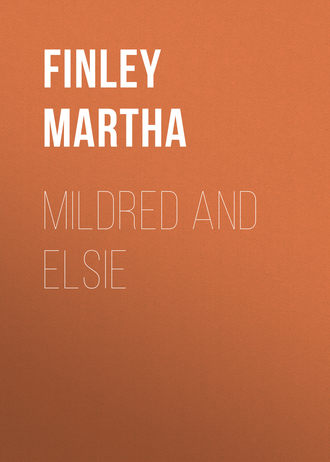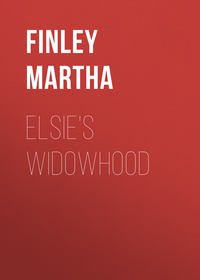 полная версия
полная версияMildred and Elsie
The last to leave them was an elderly lady who had been occupying the back seat along with Mildred since the stage had started that morning. When it drew up before her door, Mr. Lord alighted and politely handed her out. On getting in again, instead of resuming his former seat, he took the one she had just vacated.
Mildred's heart gave a throb and the color rushed over her face, for she foresaw what would follow. Still she would foil him if possible, and perhaps their numbers might be presently again augmented as they rolled onward.
With that last thought in his mind also, the gentleman was disposed to seize his opportunity instantly. He cleared his throat, turned to his companion, and opened his lips; but with her back toward him she was gazing eagerly from the window.
"Look, look at those maples!" she cried; "was there ever more gorgeous coloring? How perfectly lovely the woods are! And the weather is delightful to-day. October is the pleasantest month of the year for travelling, I think."
"Any month and any weather would be pleasant to me with you for my companion," he said, "and nothing, my dearest girl, could make me so supremely happy as to secure you as such for the whole journey of life."
She feigned not to have heard or fully understood. "I for one have travelled quite far enough," she responded, still keeping her face toward the window. "I'm tired of it, and of being so long away from the dear home-circle. Oh, I am so glad that I shall be with them to-morrow, if all goes well!"
"God grant it, dear Mildred; I shall rejoice in your happiness and theirs, but – "
"Oh see!" she interrupted, pointing to a group of trees near the roadside, "what brilliant reds and yellows! And there! what a beautiful contrast those evergreens make!"
"Yes; God's works are wonderful and his ways past finding out," he answered devoutly, then kept silence; while for some minutes Mildred rattled on, hardly knowing or caring what she was saying so she might but avoid the necessity of listening to and answering the proposal he was evidently so desirous to make.
But his silence disconcerted her, he did not seem to hear her remarks, and at length she found herself too much embarrassed to continue them. For five minutes neither spoke, then he made her a formal offer of his heart and hand, which she gently but decidedly declined, saying she felt totally unfit for the position he would place her in.
He said that in that he could not agree with her; he had never met any one who seemed to him so eminently fitted for the duties and responsibilities he had asked her to assume. "And he loved her as he never had loved and never could love another. Would she not reconsider? Would she not be persuaded?"
She told him she highly esteemed him as a man and a minister, that she felt greatly honored by his preference, but could not love him in the way he wished.
"Ah," he said, "what a sad blunderer I am! I see have spoken too soon. Yet give me a little hope, dear girl, and I will wait patiently and do my best to win the place in your heart I so ardently covet."
She could not bring herself to acknowledge that that place was already filled, and he would not resign the hope of finally winning her.
During the rest of that day and the morning of the next he treated her to frequent, lengthened discourses on the duty of every one to live the most useful life possible, on the rare opportunities of so doing afforded by the position of minister's wife, and on the permanence and sure increase of connubial love when founded upon mutual respect and esteem, till at length a vague fear crept over her that he might finally succeed in proving to her that it was her duty to resign the hope that at some future day the barrier to her union with the man of her choice would be swept away, and to marry him on account of the sphere of usefulness such a match would open to her.
She heard him for the most part in silence, now and then varied by a slight nod of acquiescence in the sentiments he expressed, yet even from these scant tokens of favor he ventured to take courage and to hope that her rejection of his suit would not prove final.
It was a great relief to her that they were not alone for the last ten miles that lay between them and Pleasant Plains.
CHAPTER V
"Nor need we power or splendor,Wide hall or lordly dome;The good, the true, the tender —These form the wealth of home."Mrs. Hale.Could that be home – that pretty, tasteful dwelling, embosomed in trees, shrubs, and vines? Mildred was half in doubt, for the house itself seemed to have grown as well as the vegetation that environed it. But yes, the stage was stopping: and there were father and Rupert at the gate, mother and the rest on the porch; every face beaming a joyous welcome.
How Mr. Lord envied them as the stage whirled him rapidly away, out of sight and hearing of the glad greetings!
We will not attempt to describe these: there were close embraces, tears of joy, low-breathed words of tenderness and love, of gratitude to Him who had preserved a beloved child in all her journeyings, and brought her to her home again in safety and health; and there were shouts of delight from the little ones, to whom it seemed half a lifetime since sister Milly went away.
"How we have missed you! and, oh, how glad we are to have you back again!" her mother said, looking smilingly at her, but with glistening eyes.
"She's changed," said Rupert, regarding her critically; "she's prettier than ever, and – and something else."
Zillah supplied the word – "More stylish."
"And you! why, you are a young lady!" exclaimed Mildred, gazing at her in astonishment.
"I'm fifteen, and taller than you, I do believe," returned Zillah, laughing and blushing.
"And how you're all grown!" Mildred went on, glancing round the circle.
"Except father and mother," laughed Rupert. "Haven't I nearly caught up to father in height?"
"So you have, and I shall be very proud of my big brother."
"Well, I declare, if you hain't come at last – thought you never was a comin'!" exclaimed a voice in Mildred's rear; and as she turned quickly about, a toil-hardened hand seized hers in a grasp that almost forced from her a little cry of pain.
"Yes," she said, "I have, and am very glad to find you here, Celestia Ann. You kept your promise."
"A heap better'n you did yours. Why you stayed more'n as long agin as you said you was agoin' to when you went off. Had a good time?"
"Yes; but I'm very glad to get home."
"So you'd ought to be. You look right down tired; and I reckon you are all that, and hungry, too. Well, I'll have dinner on table in about ten minutes;" and with the last word she vanished in the direction of the kitchen.
A look of expectant delight was on every face of the group about Mildred as the mother, saying, "Come, dear child, you will want to get rid of some of the dust of travel," led the way from the room, the others all following.
"Why, the house has grown too," was the young girl's delighted exclamation, as she was ushered into an apartment she had never seen before – large, airy, neatly and tastefully though inexpensively furnished; white muslin curtains at the windows, a snowy counterpane on the bed; everything new and fresh except the books in the hanging shelves on the wall, and some little ornaments which she recognized as her own peculiar property.
"Yes," her father answered, smiling fondly upon her, "so much so that we shall now have abundance of room, even with our eldest girl at home, and we hope it will be a very long while before she will want to run away again."
"Yes, indeed, father dear," she said, putting her arms around his neck; "oh, if you only knew how glad I am to get back!"
"This is your room, Milly; do you like it?" the children were asking in eager tones.
"Yes, yes, indeed! it is perfectly lovely! But, mother, it ought to be yours; it is larger and cheerier than yours."
"Ah! you are assuming to know more than you do, my child," laughed Mrs. Keith. "I, too, have one of the new rooms – there are six in all – and it is in every respect quite equal to this. But make haste with your toilet, for the dinner bell will soon ring."
They lingered at the table, eating slowly, because there was so much talking to be done – such pleasant, cheerful chat.
Then came the opening of Mildred's trunk, and the distribution of the purchases she had been commissioned to make, and of her own modest gifts to father, mother, brothers, and sisters, and the more expensive ones from Aunt Wealthy and the Dinsmore relatives. Of these last, little Elsie's were by far the most costly and valuable.
The children were wild with delight, the parents quietly happy in their pleasure, and gratified with the remembrances to themselves.
Mildred exhibited her watch and chain, calling forth exclamations of intense admiration and hearty congratulations.
"O sister Milly, how lovely!" cried Zillah; "I never saw anything so beautiful, and I'm so glad you have it! I don't believe there's another lady in town who has a gold watch."
"No, I presume not," returned Mildred, gazing down upon it with a pleased, but rather absent look, "and it is extremely pretty; yet not half so beautiful as the dear little giver." And then she launched out into the warmest of eulogies upon little Elsie – her loveliness of both person and disposition.
"She must have loads of money to buy you that splendid watch, and all these things for the rest of us," remarked Cyril.
"Yes, indeed! I'd like to be in her place," said Ada.
"I wouldn't," said Mildred; "and I don't believe you would, Ada, if you quite understood her position."
"Why?" the children asked, clustering close about their sister, with looks of surprise and eager interest; "tell us why. It must be nice to be so rich; to own houses and lands, and all sorts of things."
"Do not be too sure of that," said their father; "though poverty has its trials, wealth brings cares, and cannot of itself give happiness; in fact, it has sometimes proved a curse to its possessors. Remember our Saviour said, 'How hardly shall they that have riches enter into the kingdom of God.'"
"Yes," added Mrs. Keith; "and in another place he says, 'Take heed and beware of covetousness; for a man's life consisteth not in the abundance of the things which he possesseth.'"
"But some rich people are good, aren't they?" queried Cyril. "I'm sure Milly said Elsie was."
"But she's just a baby girl," put in Don, "and maybe she'll get bad by the time she grows up."
"Now, boys, keep quiet, can't you? and let's hear what Milly's going to tell," said Ada.
Mildred glanced at the nearly emptied trunk, the piles of clothing on the bed and chairs, and shook her head. "Another time, children; I ought to be putting these things in place in the wardrobe and bureau."
"Oh! you're too tired. Sit down in the rocking-chair and rest while you talk, and I'll help you afterward to arrange your things," Zillah said; and with a word of thanks Mildred yielded.
Taking Annis on her lap, and glancing with a half smile from one eager, expectant face to another, "What would any one of you sell all the rest for?" she asked.
Several pairs of young eyes opened wide with astonishment. "Why, Milly, what a question!" "Not for anything!" "Not for all the world! You know we wouldn't!" were the answering exclamations; and then there were loving looks exchanged, and Don gave Fan a hug, while Cyril squeezed her hand and patted Annis on her curly head.
"It would be dreadfully lonesome not to have any brothers or sisters!" he said, with a long-drawn sigh of satisfaction.
"Little Elsie has none," said Mildred. "But what if we had no mother, children?"
"Milly, don't! what makes you say such things!" cried Fan, hastily releasing herself from Don, and running to her mother to hide her face in her lap with a half sob.
"No; what's the use?" Zillah asked huskily, while Ada's eyes filled and the boys looked distressed, as though the idea was too painful to contemplate.
"Just to convince you that little Elsie is not so much to be envied by us. She has no mother, has never seen her father, and does not know whether he loves her or not."
"Does she show any desire to see him?" asked Mrs. Keith, stroking Fan's hair.
"Oh yes, mother! yes, indeed! She talks a great deal about him, often wishes he would come home, and is never more interested than when he is the theme of conversation."
"I hope her grandfather and his wife love and fondle her?"
"Not at all; they treat her with almost unvarying coldness and neglect!" Mildred said, her eyes sparkling with indignant anger.
Then she went on to tell of various acts of injustice and oppression to which the little girl had been subjected since her coming to Roselands, and to give a pathetic description of her loneliness and unsatisfied yearning for the love of her kindred. In conclusion, Mildred asked, "Now would any of you change places with her?"
"No, no, indeed we wouldn't! Poor dear little thing! we're very sorry for her," the children cried in chorus.
"Mother, mayn't Elsie come here and be your little girl 'long with us?" asked Annis.
"I should gladly take her, darling, if I could," Mrs. Keith answered; "but she belongs to her father, and it is he who directs where she shall live."
"Tell us some more, Milly; tell about that beautiful Viamede," entreated Ada, putting an arm coaxingly round her sister's neck.
"Some other time; but now I must really go to work and finish my unpacking."
"No, you must go into another room and lie down for an hour or two," said her mother. "You need rest and sleep; and your sisters and I will set things to rights here."
Mildred objected. "Mother, dear, I have come home to ease your burdens, not to add to them."
"And which will you do by wearing yourself out and getting sick?" asked the mother, with a merry look and smile. "Set these younger ones a good example by prompt obedience to my direction. We want you bright for a good long talk after tea."
"But, mother, you always have so much to tax your time and strength, and – "
"Run away now, without another word," was the playful reply. "I'm neither busy nor tired this afternoon."
So Mildred went, slept soundly for a couple of hours, and toward tea-time came down to the sitting-room, looking quite rested and refreshed; very sweet and pretty, too, they all thought, in new and tasteful attire, and with her glossy brown hair becomingly arranged.
She found her mother and the older girls sewing.
"How nice you look!" Zillah said, surveying her admiringly. "That's a lovely dress, and made so prettily! Will you let me have mine made like it?"
"Yes, indeed, and help you make it, too. Mother, how have you managed with the sewing while I've been gone?"
"Pretty well, Milly. Zillah has become quite a needle-woman, and Ada does remarkably well, too, considering her imperfect sight. Housework suits her best on that account. They are dear, helpful girls – both of them."
"Milly, Milly," cried Cyril, rushing in from the grounds, "come and look at our gardens, and our hens and chickens, before it grows too dark."
"The gardens aren't much to look at now," laughed Zillah.
"But she can see pretty well what they have been, and we'll tell her the rest," returned Cyril, leading the way.
"Come, girls, we'll all go," Mrs. Keith said, folding up her work; "the rest of the afternoon and evening shall be a holiday, in honor of our wanderer's return."
There was, in truth, little to exhibit in the gardens now, save a few late-blooming fall flowers; but Mildred admired them, and listened with interest to the accounts given of what had been raised by each little worker during the past spring and summer.
And there was really a large flock of fowls, all in fine condition, promising plenty of eggs and poultry even through the cold winter months; for Rupert had built a snug hen-house to protect these feathered friends from the inclemency of the weather.
"Now this way, Mildred; I want to show you the vines I've trained over the front porch," Rupert said.
As they stood looking at the vines, the front gate opened and shut, and a firm, elastic step came quickly up the walk. Mildred turned and found an old acquaintance at her side.
"Wallace – Mr. Ormsby!" she exclaimed, offering her hand in cordial greeting, though the rich color surged over her face with the sudden recollection of his parting words, spoken a year ago.
"No; keep to the first name, please," he said in an undertone, as he grasped her offered hand. "Excuse so early a call, but I did not know how to wait. It seems an age since you went away."
"We are always glad to see you, Wallace," said Mrs. Keith. "You must stay and take tea with us; it is nearly ready. Come, we will all go in now, for the air is growing chilly."
Ormsby was by no means loath to accept the invitation. Mildred seemed to him lovelier than ever, and his eyes were constantly seeking her face, when politeness did not require him to look elsewhere. Enchanted anew by her charms of person, manner, and conversation, he lingered for an hour or more after tea, watching, hoping for an opportunity to breathe some words into her ear which should reach no other.
But parents, brothers, and sisters clustered about her, and soon other neighbors began to drop in to bid her welcome home – Dr. Grange and his daughter, Claudina Chetwood and her brother Will, and one or two others of those who were most intimate with the family. Then a look from Mr. Keith reminding Wallace of an important paper which should be drawn up that evening, he took a reluctant leave.
He paused an instant at the gate to glance back regretfully at the brightly lighted parlor windows and the comfortable-looking group within, of which Mildred was the centre.
A tall, muscular figure was approaching from the opposite direction as Ormsby, turning away with a sigh, hurried down the street toward Mr. Keith's office. There was an exchange of greetings as the two passed each other. "Good-evening, Mr. Ormsby." "How d'ye do, Sheriff?" – and each hastened on his way.
The next moment the tall man was standing where Wallace had been but now, gazing intently in at the same group; though, in truth, he scarcely saw any but that central figure – the graceful, girlish form so tastefully attired; the bright, sweet face, full of animation and intellect. He could not take his eyes from her – great, dark eyes, hungry and wistful – as for many minutes he stood resting his left hand on the top of the gate, the right arm hanging at his side.
At last, with a sigh that was almost a groan, he, too, turned and went on his way.
"She's prettier than ever – the sweetest thing alive," he murmured half aloud, "and I'll never forgit how good she was to me in that awful time when even my mother couldn't stand by me. But, for all that, 'tain't no ways likely she cares enough for Gote Lightcap to so much as ask if he's alive or no."
CHAPTER VI
"Ah me! for aught that I could ever read,Could ever hear by tale or history,The course of true love never did run smooth."Shakespeare.The callers departed to their own homes. Mr. Keith called the household together, and, as usual, closed the day with prayer and praise and the reading of the word of God.
The good-nights were exchanged, and presently Mildred sat alone in her own room, slowly taking down her wealth of rich brown hair, while thought, half troubled, half pleasurable, was busy in her brain.
A gentle tap on the door, then it was softly opened, and her mother stood by her side.
Instantly the dreamy look left Mildred's eyes, and they were lustrous with love and joy as she lifted them to the sweet face bending over her.
"Darling mother!" she cried, hastening to rise and bring forward the easiest chair in the room, "I'm so glad you have come. I am longing so for one of our old quiet talks."
"Ah! I knew it," Mrs Keith said, taking the chair; "I saw it in your eyes, dear child, and am as anxious for it as yourself. Oh, it is nice to have you at home again!"
"And so nice to be here. Mother dear, there have been times when I felt in sore need of your wise, loving counsels."
Shaking out her abundant tresses, she seated herself on a cushion at her mother's feet and laid her head in her lap, as she had been wont to do in childhood's days.
"Then I trust you carried your perplexities to a wiser Friend, whose love is even greater than that of the tenderest mother," Mrs. Keith said, gently caressing the silken hair and the blooming cheek.
"Yes, mother. Ah! what could I have done without that Friend?"
Then, with blushes and tears, she poured out the story of her love, and her refusal to engage herself, because the chosen of her heart was not a Christian man.
Mrs. Keith was a little surprised, a trifle disappointed. "I had almost set my heart on having Wallace for my future son-in-law," she remarked in a playful tone, "and no such objection could be brought against him."
"No," said Mildred, half averting her blushing face; "he is good and noble and true – a sincere Christian, I do believe, and I heartily respect and like him; but, O mother! why is it that the course of true love never will run smooth?"
"I think it does sometimes; at least often enough to prove the rule."
"I was in hopes it might have been out of sight out of mind with Wallace," Mildred said presently.
"No; Cupid's arrow had gone too deep for that. But perhaps it may prove so with the other, and you may yet learn to care for poor Wallace."
"No, mother; I am sure, quite sure, that I can never give him anything but the sisterly affection that is already his. Mother, I know girls who think it must be a delightful thing to have a number of lovers, but I don't find it so, there is so much that is painful and perplexing connected with it."
"Perplexing, my child!"
"Yes, mother. Do you – do you think it can ever be the duty of one who cannot marry the man of her choice to become the wife of another because it will open to her a wider sphere of usefulness?"
"Why that question, Mildred?" asked Mrs. Keith, in grave surprise.
"Because Mr. – Mr. Lord thinks I ought – that it is my duty to – to marry him; and though he did not convince me, he – he made me afraid it might be."
A very mirthful look had come into Mrs. Keith's eyes.
"My dear, silly little girl," she said, bending down to get a better view of the blushing face, "why did you not tell him you are quite unfit for the position he offered you?"
"I did, mother," Mildred answered, with sincere humility, "but he – still insisted. He has somehow formed a very mistaken opinion of me."
"That is a pity; but we will not let him sacrifice himself. I shall utterly refuse consent, and so will your father."
"But don't you think him a good man?" Mildred asked, lifting her head and gazing into her mother's eyes with a look of mingled relief and perplexity.
"Very good, but very unsuitable in disposition and in years for a husband for you, or a son-in-law for me. His absent-mindedness would put a great deal of care on your young shoulders. But, my dear child, leaving the question of his character and suitableness in other respects entirely out of sight, the fact that you prefer another is quite sufficient of itself to make your acceptance of his suit both foolish and wrong. Nothing can make it right for man or woman to marry one while his or her heart turns more strongly to another. As to his argument that thus a wider sphere of usefulness would be opened to you, all I have to say is, that it is not, cannot ever be right to do evil that good may come."
Mildred drew a long sigh of relief. "O mother, I am so thankful that you take that view of it! and I am sure it is the right one. You have lifted half my load, but – "
"Can you not cast the other half on the Lord?"
"I do try to. But, mother, what do you think? would it be wrong for me to – "
"Follow the dictates of your heart?" Mrs. Keith asked, as Mildred paused, leaving the sentence unfinished. "My child, that is a question for you to settle with your own conscience. You have God's holy word to guide you, and in answer to prayer he will give you the guidance of the Spirit also. I will only say that it cannot be other than a dangerous experiment for a Christian to enter into the closest of earthly relations with one who is living for this world alone."









